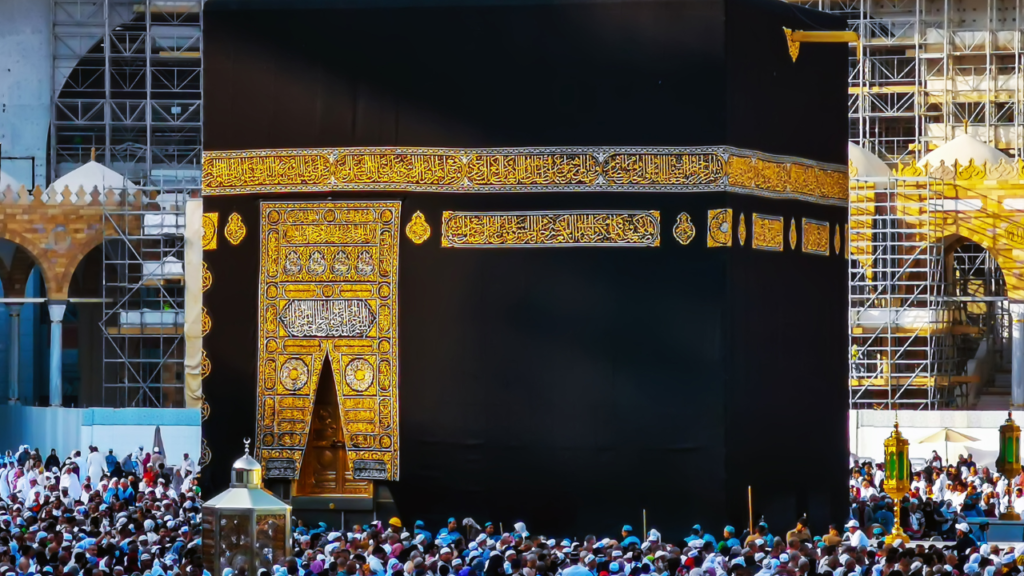Who is Hazrat Ibrahim (AS) in Islam?

Who is Hazrat Ibrahim (AS) in Islam?
Hazrat Ibrahim, known as Abraham in English, is a highly revered prophet in Islam. He holds a significant place in Islamic tradition as one of the key figures in the Abrahamic lineage of prophets.

Introduction
Hazrat Ibrahim, known as Abraham in the Judeo-Christian tradition, is a prominent and revered figure in Islam. His life and teachings are celebrated in the Quran, where he is hailed as one of the greatest prophets. Hazrat Ibrahim’s story is not only significant in its religious context but also holds valuable lessons for believers, emphasizing faith, sacrifice, and unwavering devotion to Allah (God).
Birth and Early Life
Hazrat Ibrahim was born in the city of Ur in ancient Mesopotamia (present-day Iraq) around 2000 BCE. His father, Azar, was an idol worshiper, but Ibrahim was born with an innate sense of monotheism. As a child, he questioned the worship of idols and the polytheistic beliefs of his society, leading him on a path of profound spiritual discovery.
The Call to Prophethood
According to Islamic tradition, Hazrat Ibrahim’s journey to becoming a prophet began when he received a series of divine revelations. Allah chose him as His messenger to guide people away from idol worship and toward the worship of the one true God. The Quran describes how Ibrahim questioned the prevailing beliefs of his people:
“And thus did We show Ibrahim the kingdom of the heavens and the earth, that he might be of those having certainty.” (Quran 6:75)
Hazrat Ibrahim’s Quest for Truth
One of the most well-known stories about Hazrat Ibrahim is his quest for the ultimate truth. He embarked on a journey to find God, and this spiritual journey took him through various phases of belief and understanding. He questioned the moon, stars, and the sun, only to find that they were fleeting and not the true God. Ultimately, he realized that Allah was the only true God, the Creator of all.
Hazrat Ibrahim’s Iconic Sacrifice
One of the most profound demonstrations of Hazrat Ibrahim’s faith and obedience to Allah is the story of his willingness to sacrifice his son, Hazrat Isma’il (Ishmael), as a sign of his devotion. According to Islamic tradition, Allah tested Ibrahim’s devotion by commanding him to sacrifice his beloved son. Despite the immense emotional turmoil, both father and son were willing to submit to God’s will. However, at the last moment, Allah replaced Hazrat Isma’il with a ram as the sacrificial offering, demonstrating His mercy and acceptance of Ibrahim’s unwavering faith.
Also Check
- Is Milk Halal in Islam?
- Who was the first Muslim?
- Why theft is prohibited in Islam?
- How many children did Prophet Muhammad (PBUH) have?
- Why did Allah Almighty expel Hazrat Adam and Hazrat Eve from Heaven?
Legacy and Significance
Hazrat Ibrahim’s legacy in Islam is multifaceted and profound. His unwavering faith, submission to God’s will, and willingness to sacrifice for his beliefs set an example for all Muslims to follow. The Quran praises him for his righteousness and his status as a role model:
“Indeed, Ibrahim was a [comprehensive] leader, devoutly obedient to Allah, inclining toward truth, and he was not of those who associate others with Allah.” (Quran 16:120)
Furthermore, Hazrat Ibrahim is also revered for his role in the construction of the Kaaba, the sacred house of worship in Mecca. He and his son Hazrat Isma’il were commanded by Allah to build the Kaaba as a place of worship for monotheism, and it remains the focal point of the Islamic pilgrimage, the Hajj.
Conclusion
Hazrat Ibrahim’s life and teachings in Islam serve as a powerful reminder of the importance of unwavering faith, devotion to God, and submission to His will. His story continues to inspire Muslims around the world, emphasizing the significance of monotheism and the rejection of idolatry. Hazrat Ibrahim’s legacy lives on in the hearts of believers as a symbol of faith and sacrifice, making him one of the most revered prophets in Islam.

FAQs About Hazrat Ibrahim (AS in Islam
Who is Hazrat Ibrahim in Islam?
Hazrat Ibrahim, known as Abraham in English, is a highly revered prophet in Islam. He holds a significant place in Islamic tradition as one of the key figures in the Abrahamic lineage of prophets.
What role did Hazrat Ibrahim play in Islamic history?
Hazrat Ibrahim played a pivotal role in spreading monotheism (the belief in one God) in a time when idol worship was prevalent. He is considered the father of monotheism and the patriarch of the Abrahamic faiths, including Islam, Judaism, and Christianity.
How is Hazrat Ibrahim’s story described in the Quran?
The Quran contains several chapters (surahs) that recount the life and experiences of Hazrat Ibrahim. His story is detailed in various verses, including his journey to monotheism, his construction of the Kaaba in Mecca, and his willingness to sacrifice his son as a test of faith.
What is the significance of the Kaaba in Hazrat Ibrahim’s life?
Hazrat Ibrahim, along with his son Hazrat Isma’il (Ishmael), is believed to have built the Kaaba, the holiest sanctuary in Islam located in Mecca. This sacred structure is the focal point of the Hajj pilgrimage and a symbol of unity for Muslims worldwide.
Did Hazrat Ibrahim have any notable descendants in Islamic tradition?
Yes, Hazrat Ibrahim had several notable descendants in Islamic tradition, including his sons Hazrat Isma’il and Hazrat Ishaq (Isaac). Prophets from both of these lineages are considered important figures in Islam.
What is the significance of Hazrat Ibrahim’s willingness to sacrifice his son?
Hazrat Ibrahim’s willingness to sacrifice his son as an act of obedience to God is a powerful symbol of faith and submission to the Divine will. This event, known as the “Ibrahim’s Sacrifice” or “Ibrahim’s Offering,” is commemorated during the Islamic holiday of Eid al-Adha.
Are there any other important stories or events associated with Hazrat Ibrahim in Islam?
Yes, there are numerous stories and events associated with Hazrat Ibrahim in Islamic tradition, such as his confrontation with idol worshippers, his journey through the desert, and his supplication for the well-being of his descendants.
How is Hazrat Ibrahim honored in Islamic practice and rituals?
Hazrat Ibrahim is honored in various Islamic practices, including the recitation of his story during religious gatherings, the performance of the Hajj pilgrimage, and the annual celebration of Eid al-Adha, which commemorates his willingness to sacrifice his son.
Is Hazrat Ibrahim regarded as a prophet in other Abrahamic religions?
Yes, Hazrat Ibrahim is recognized as a prophet in Judaism and Christianity as well. He is considered a common ancestor of these three monotheistic faiths and is held in high esteem by followers of all three religions.
How does the story of Hazrat Ibrahim inspire Muslims in their faith and devotion?
The story of Hazrat Ibrahim serves as a source of inspiration for Muslims, emphasizing the importance of unwavering faith, submission to God’s will, and the unity of monotheism. His devotion and sacrifice are seen as exemplary acts of faith that continue to guide believers in their spiritual journey.






